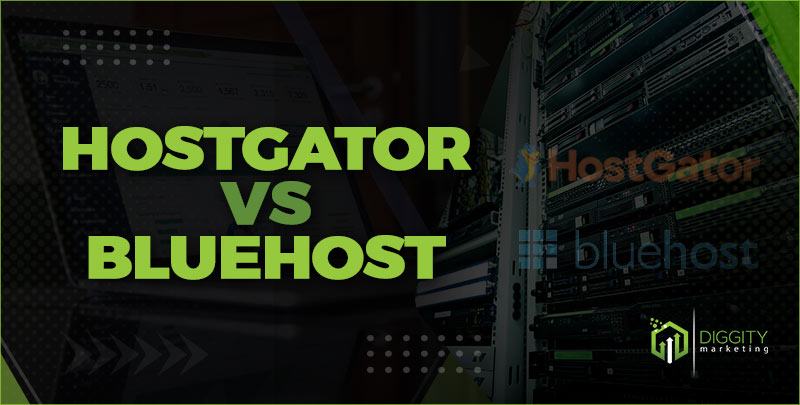
HostGator and Bluehost are two leading web hosting providers known for their affordable packages. As an SEO specialist and owner of an affiliate marketing agency, I’ve extensively tested both hosting services to bring you a comprehensive head-to-head comparison.
Our in-depth comparison of HostGator and Bluehost covers essential categories, such as speed, uptime, security, and customer support, to help you make an informed decision about which provider best meets your needs.
Table Of Contents
- Introducing Hostgator
- Introducing Bluehost
- Bluehost vs Hostgator: Web Hosting Plans Compared
- Features Comparison: How We Determined which Web Host is Better
- What to Look for When Choosing a Web Hosting Provider
- Pros & Cons
- Hostgator vs Bluehost: A Look on Sustainable Hosting
- Training and Educational Resources
- FAQs
- Our Verdict on Hostgator Vs. Bluehost
Introducing Hostgator
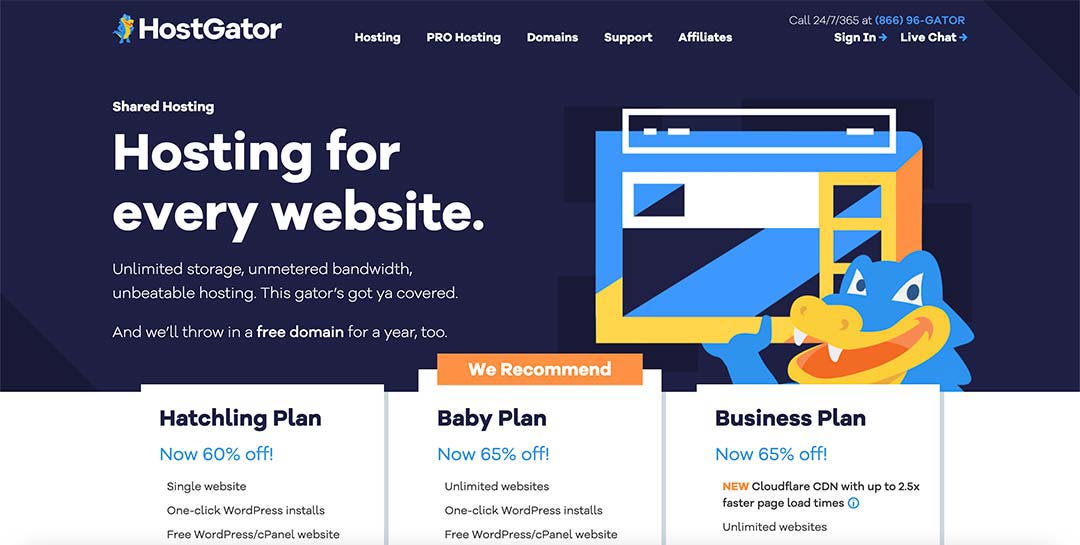
Founded in 2002, Hostgator quickly made a name for itself in the hosting market. It has hosted over 2.5 million websites and operates with over 1,000 full-time staff.
So it’s no surprise why Hostgator was acquired in 2012 by the Endurance International Group (EIG) for an aggregate purchase price of $299.8 million.
Introducing Bluehost
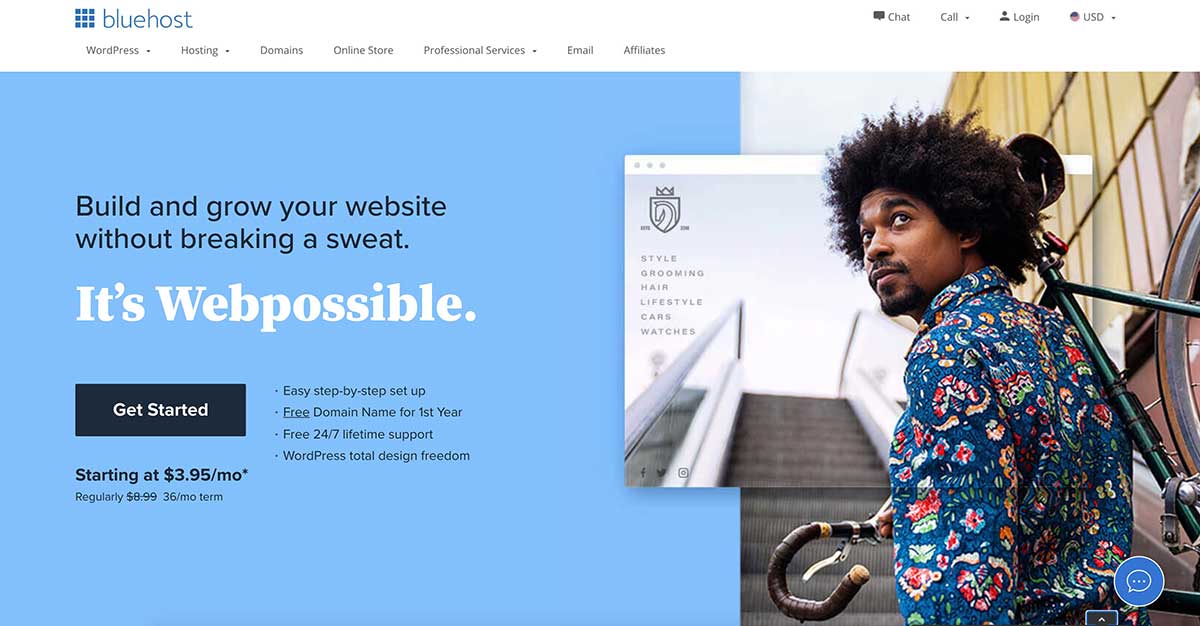
Founded in 2003 in Utah, Bluehost also powers over 2 million websites. With 750+ employees on its roster, the company has seen slightly lower growth levels than Hostgator.
However, Bluehost has been on an upward trend with no signs of slowing down since it first opened its doors. In 2010, they were also acquired by EIG which now owns a solid portfolio of hosting companies.
We were surprised to see one company does indeed offer better performance. However, the other web host offers more value and a lower price tag.
Bluehost vs Hostgator: Web Hosting Plans Compared
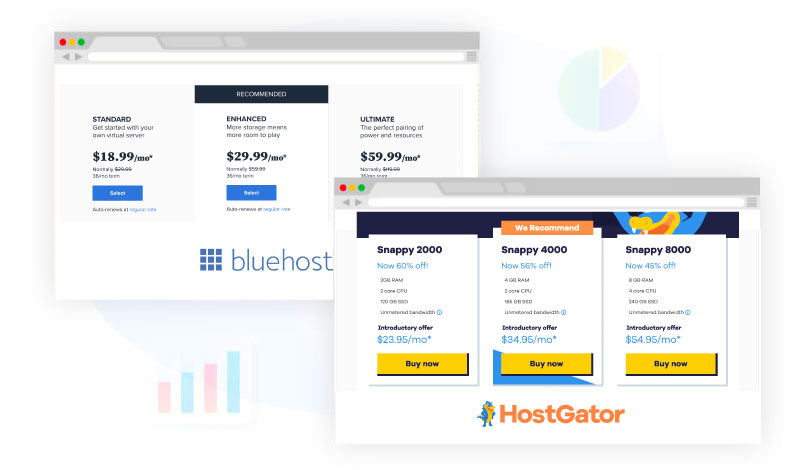
| Bluehost | Hostgator | |
|---|---|---|
| Cheap Shared Hosting | ||
| Managed WP Hosting | ||
| Managed Woocommerce Hosting | ||
| Cloud Hosting | ||
| VPS | ||
| Dedicated Server Hosting | ||
| Reseller Hosting |
The only initial differences appear to come down to managed Woocommerce hosting and cloud hosting options. At first glance, it appears that the plans offered by Hostgator and BlueHost are very similar.
Bluehost supports e-commerce store owners using WordPress by offering managed Woocommerce hosting. Hostgator doesn’t.
On the other hand, Hostgator offers cloud hosting options though Bluehost doesn’t.
All in all, Hostgator and Bluehost are very popular because of their cheap pricing. So all their services are suited to website owners who are willing to sacrifice performance for a lower price tag.
When looking at Hostgator vs Bluehost pricing. Both web hosts offer cheap deals on the condition that you sign up for a long-term plan.
In addition to their evergreen deals, you can also score extra discounts during sale periods such as Black Friday and Cyber Monday.
That’s why they have as high a market share as they do. They are among the most affordable web hosts on the market.
Evergreen Promotional Pricing
| Plan | Hostgator Plans | Bluehost Plans |
|---|---|---|
| Lowest Tier | $2.75/month | $2.95/month |
| Middle Tier | $2.75/month | $5.45/month |
| Highest Tier | $5.25/month | $13.95/month |
Bluehost’s promotional pricing is available for a 12-month term, whereas Hostgator’s is available for up to 3 years if you buy 36 months upfront.
Interestingly, if you wanted to buy 36 months upfront with Bluehost, you’d be charged $4.95/ month instead of $2.95/month (for their lowest tier). It’s still a discount compared to the renewal rate through almost double the cost of their cheapest deal.
In any case, if the price is your biggest concern, Hostgator’s promotional pricing works out cheaper.
Renewal Pricing
| Plan | Hostgator Plans | Bluehost Plans |
|---|---|---|
| Lowest Tier | $6.95 - $10.95/month | $8.99 - $10.99/month |
| Middle Tier | $9.95 - $11.95/month | $11.99 - $16.99/month |
| Highest Tier | $14.95 - $16.95/month | $16.99 - $20.99/month |
Winner: Hostgator is a clear winner on shared hosting if the price is a concern for you. It comes in cheaper for both the promotional and renewal pricing rates.
2. Managed WordPress Website Hosting

Bluehost is a top hosting provider for many WordPress websites. It is recommended by WordPress.org, alongside DreamHost and Siteground [1].
However, Hostgator also offers WordPress site hosting.
We have covered the difference between Dreamhost and Hostgator, and Siteground vs Hostgator in different articles.
Hostgator does not offer managed Woocommerce hosting for any WordPress-based e-commerce stores though Bluehost does.
Promotional Pricing
| Plan | Hostgator WordPress Hosting | Bluehost WordPress Hosting |
|---|---|---|
| Shared WP | From $2.75/month | From $2.95/month |
| Managed WP | From $5.95/month | From $9.95/month |
| Managed Woocommerce | N/A | From $12.95/month |
Renewal Pricing
| Plan | Hostgator WordPress Hosting | Bluehost WordPress Hosting |
|---|---|---|
| Shared WP | From $6.95/month | From $8.99/month |
| Managed WP | From $14.95/month | From $19.95/month |
| Managed Woocommerce | N/A | From $24.95/month |
Winner: Hostgator comes out on top with regard to pricing for shared and managed WordPress hosting.
However, if you have an e-commerce store, Bluehost is the better host of the two.
3. VPS & Dedicated Hosting Plans
Shared, VPS and dedicated hosting have different features.
 Shared hosting uses a single server and hosts multiple websites on it. It means your website is open to vulnerabilities affecting the other websites on the same server.
Shared hosting uses a single server and hosts multiple websites on it. It means your website is open to vulnerabilities affecting the other websites on the same server. VPS hosting uses a virtual environment that imitates a dedicated server. It’s still shared hosting, but you get a partitioned space with all its resources to yourself.
VPS hosting uses a virtual environment that imitates a dedicated server. It’s still shared hosting, but you get a partitioned space with all its resources to yourself. Dedicated hosting allows you to have your own server and is recommended for sites with loads of traffic coming to them every month.
Dedicated hosting allows you to have your own server and is recommended for sites with loads of traffic coming to them every month.
VPS Hosting
| Promotional Pricing | Renewal Pricing | |||
|---|---|---|---|---|
| Plan | Bluehost | Hostgator | Bluehost | Hostgator |
| Middle Tier (2GB Ram) | $19.99/month | $19.95/month | $29.99/month | $79.95/month |
| Highest tier (4GB Ram) | $29.99/month | $29.95/month | $59.99/month | $119.95/month |
| Enterprise (8GB Ram) | $59.99/month | $39.95/month | $119.99/month | $149.95/month |
It depends on whether price or features matter more to you. As far as price goes for VPS web hosting, Hostgator has slightly lower promotional prices. They’re negligible unless you’re considering a plan offering 8GB RAM.
Winner: We’ve chosen Bluehost for this round because of their significantly cheaper renewal prices. You could save up to $50 a month.
In saying this, if you’re looking for more SSD storage, Hostgator offers significantly more and with unlimited bandwidth to boot.
Dedicated Hosting
| Promotional Pricing | Renewal Pricing | |||
|---|---|---|---|---|
| Plan | Bluehost | Hostgator | Bluehost | Hostgator |
| Lowest Tier | $79.99/month | $89.98/month | $109.99/month | $189/month |
| Middle Tier | $99.99/month | $119.98/month | $159.99/month | $249/month |
| Highest tier | $119.99/month | $139.99/month | $209.99/month | $289/month |
Once again, at first glance, it appears that Bluehost is significantly cheaper than Hostgator. However, for the value that Hostgator’s hosting plans include, the additional price may be worth it to you.
Winner: We’re handing it to Hostgator for this round.
Hostgator’s smallest plan offers 4 core/ 8 thread and 8 GB RAM. To get the same features with Bluehost, you would be paying more per month unless you buy 36 months in advance.
Honestly, if you can afford to pay that much upfront, your website will likely need a better-performing solution than what either Bluehost or Hostgator can offer.
Features Comparison: How We Determined which Web Host is Better
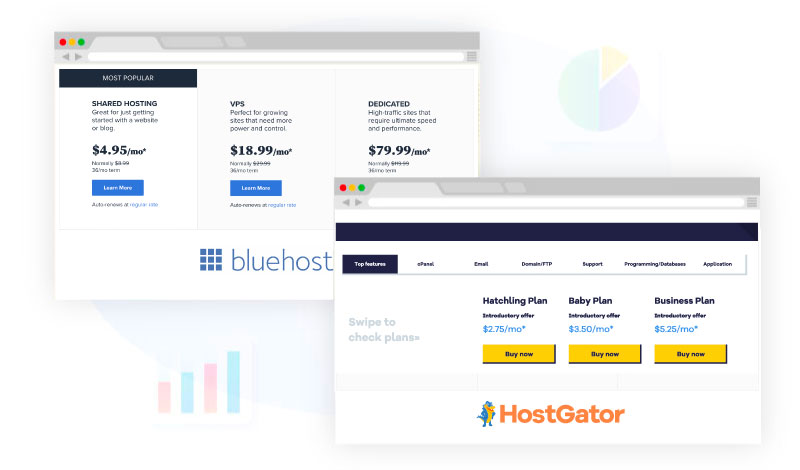
1. Ease of Use
Both Bluehost and Hostgator offer classic cPanel-based solutions. It can seem a little daunting for people just starting to navigate a cPanel dashboard. You can also feel overwhelmed with all the upsell offers that show up.
However, there are many features and actions you can perform in this space once you get the hang of it.
Winner: Both are just as intuitive and easy to use as each other.
2. Speed
I learned the hard way that slow-loading websites are constantly losing income. Since then, I’ve solely rely on web hosting providers with efficient performance.
We put Bluehost and Hostgator to the test to see which company has better site speed.
GT Metrix
Hostgator | Bluehost | |||||
|---|---|---|---|---|---|---|
| Performance Score | TTFB | Fully Loaded Time | Performance Score | TTFB | Fully Loaded Time | |
| Vancouver | 48% | 1.6s | 12.7s | 67% | 559ms | 4.8s |
| London | 27% | 1.7s | 7.1s | 39% | 439ms | 8.1s |
| Sydney | 12% | 1.3s | 9.5s | 34% | 872ms | 8.2s |
Pingdom
Hostgator | Bluehost | |||
|---|---|---|---|---|
| Pingdom Performance | Pingdom Load Time | Pingdom Performance | Pingdom Load Time | |
| San Francisco | 65 | 3.24s | 70 | 3.41s |
| Frankfurt | 65 | 2.84s | 70 | 2.94s |
| Tokyo | 65 | 3.09s | 71 | 3.15s |
| London | 64 | 5.70s | 70 | 1.5s |
| Washington DC | 64 | 3.65s | 71 | 1.63s |
| Sydney | 64 | 3.41s | 71 | 3.14s |
Winner: We’re handing this one to Bluehost. The data above indicates better performance compared with Hostgator.
But, we’re not gonna lie; we weren’t super impressed by either of these companies as far as speed performance is concerned.
If speed is an essential feature for your website, check out our post on the fastest web hosting companies. Compared to other companies on this list, Bluehost does offer a nice balance between affordability and performance.
3. Uptime
From my years of hosting different websites, I’ve learned that the best web hosting services should offer an uptime score of at least 99.9%.
Hostgator guarantees 99.90%, whereas Bluehost guarantees 99.98%.
Hostgator Uptime
Historically, Hostgator had the highest uptime guarantee for shared web hosting at 99.99%.
We’ve noticed that Hostgator’s servers’ performance was unable to meet this level of uptime over recent years. Instead of improving its server infrastructure, Hostgator has opted to reduce their uptime guarantee to 99.90%.
This allows Hostgator’s servers to experience up to 8 hours and 45 minutes of downtime per year instead of just 52 minutes – per the original guarantee.
While Hostgator’s web hosting packages were unable to meet the original guarantee, uptime is generally relatively stable, with only 4 downtime events in 2021. According to Pingdom’s uptime monitoring, Hostgator’s average uptime has been 99.89% since 2015 [2].
Bluehost Uptime
Bluehost has experienced a few more downtime events than Hostgator in recent years. In 2021, there were 22 minutes of downtime in total, and most downtime events lasted longer than 3 minutes.
This means that Bluehost occasionally is unable to meet its guarantee. However, historically, Bluehost has a higher uptime rate than Hostgator even when it is unable to meet the guarantee.
| 2018 Uptime | 2019 Uptime | 2020 Uptime | 2021 Uptime | |
|---|---|---|---|---|
| Hostgator | 99.98% | 99.94% | 99.91% | 99.98% |
| Bluehost | 99.99% | 99.98% | 99.96% | 99.98% |
Winner: We’re handing it to Bluehost. Solid uptime is a critical feature you should be looking for in your web hosting provider if you care about your site’s performance.
4. Customer Support
When I was new in the business, I reached out to customer support on many occasions for guidance. Every user knows the value of good customer relations, and since Hostgator and Bluehost cater to beginner markets, technical help is invaluable.
To compare the level of customer support between these two web hosting providers, we turned to Trustpilot. You can access Bluehost’s page here, and Hostgator’s here.
Bluehost’s Support

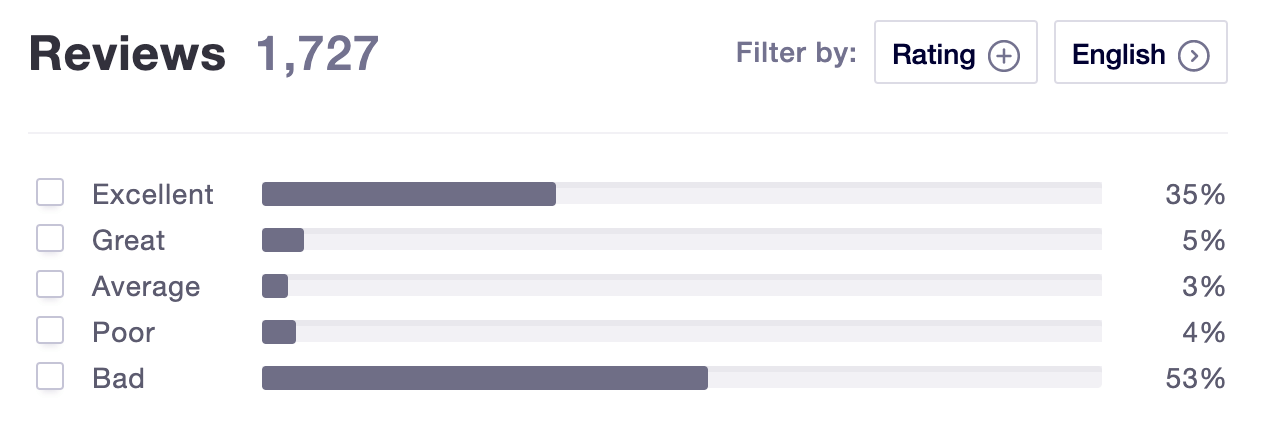
Bluehost’s rating on Trustpilot
Hostgator’s Support
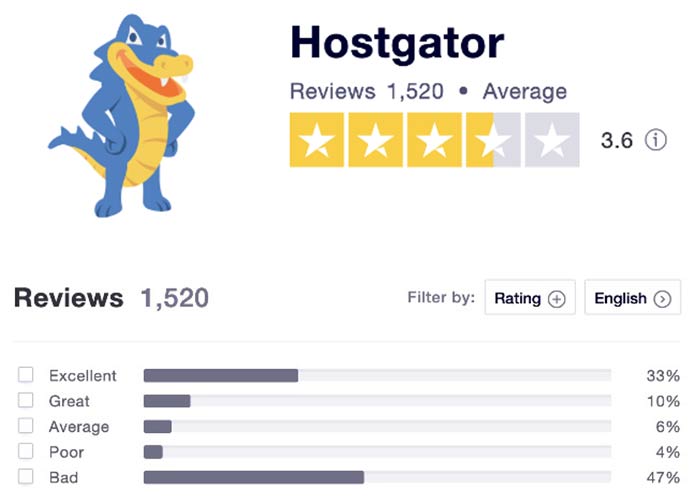
Hostgator’s rating on Trustpilot
It’s clear in our Bluehost vs Hostgator comparison that they both offer average support.
Winner: If we had to pick one, we’re going with Hostgator only because there is a smaller percentage of bad reviews. The overall average is also higher so that helps.
Check out our list of the best small business hosting companies for alternatives if customer support is as important to you as it is to us.
5. CDN
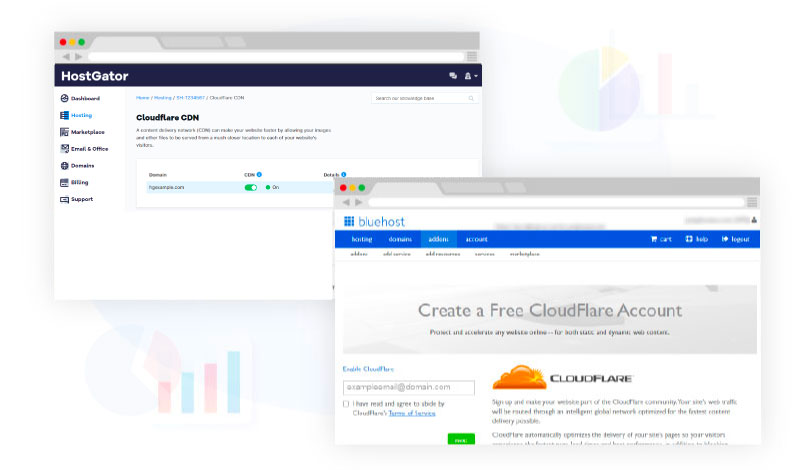
Based on my experience, Content Delivery Network (CDN) is an absolute necessity to expand my website’s global reach. The platform enabled my network to reach a worldwide audience.
Both Hostgator and Bluehost offer free CDN options, and you can choose between SiteLock CDN or Cloudflare.
As far as the best free CDN service available, Cloudflare is firmly in the lead. Offering incredibly fast content delivery for both static and dynamic content, Cloudflare can help businesses reach global audiences without sacrificing the loading speed of their websites.
Compared to Cloudflare, SiteLock leaves a lot to be desired.
Winner: It’s a tie since both hosts offer the same features for free and through the same providers.
6. Servers & Locations
Before I targeted specific market elsewhere in the world, I made sure my hosting provider had a server located near the area. A strategically placed server increases the speed and uptime of your websites.
Both Hostgator and Bluehost have servers in the US.
The locations of Bluehosts’s data centers are unclear on their website. So we reached out to support and confirmed they are only available in Utah, US.
Hostgator’s data centers are located in Utah and Texas. You can find out more about Hostgator’s servers here.
Winner: It’s a tie. Neither company offers flexibility with server locations.
7. Storage
I once set up a website for a client who was in the online selling business. I first determined the amount of images, photos, charts and videos the website required before I recommended a web host that offers high storage capacity.
Hostgator offers unmetered storage on all shared plans. Bluehost offers only 50GB on their lowest tier of the shared web hosting plan and unlimited on the rest.
A quick word about unlimited vs unlimited bandwidth. Essentially, it’s the same thing. No web host can truly offer unlimited storage since every server has a storage capacity.
However, instead of only allocating you a fixed amount of the disk’s storage space, with unmetered hosting, you can use as much as you need.
Regarding dedicated and VPS hosting, Hostgator offers more storage and RAM for lower prices.
Winner: Hostgator since there is no hard limit on any shared hosting plans, and they also offer more storage for lower rates on VPS and dedicated hosting plans.
8. Security
Since I’ve used Bluehost and Hostgator on some of my clients’ websites, I’ve learned of their security features, and it’s shown in the table below.
| Bluehost | Hostgator | |
|---|---|---|
| Free SSL Certificate | Yes (Let’s Encrypt) | Yes (Let’s Encrypt) |
| Free Domain Privacy | Only on Expensive Tiers | Paid Option |
| Hotlink Protection | Yes | Yes |
| Spam Protection | Yes (Akismet) | Paid Option - Spam Assassin |
| Free Automatic Backups | Only on Expensive Tiers | Yes (Weekly) |
| Web Application Firewall | Yes | Yes |
| DDoS Protection | Yes | Yes |
| Brute Force Protection | Yes | Yes |
| Bot Blocking | Yes | Yes - Manual |
| Malware Protection | Yes (Daily Automated) | Paid Option |
| 24/7 Server Monitoring | No | Yes |
| WP Security Plugin | No | No |
Winner: It’s a tough call since many features sound the same on the surface. We’re handing it to Hostgator, though.
9. Backups
I’ve always made sure that the web host I employ offers a reliable backup system.
Hostgator and Bluehost cater mostly to beginners and a good backup system is absolutely necessary.
If anything ever goes wrong, being able to restore a backup easily will make all the difference.
However, upon researching the backup policies of both Hostgator and Bluehost, we’re a little disappointed with what we found.
Bluehost’s Backup Policy
Bluehost makes it very clear that they take no responsibility for failed backups. They do offer free backups for customers, but they’re “not guaranteed in any way”[3].
Free backups are only included in Bluehost’s more expensive plans.
Also, Bluehost doesn’t offer redundant or mirrored backups.
Redundant data storage provides a real-time fail-safe against hard drive failure.
Mirrored backups are exact copies of your data. Another failsafe in case something goes wrong.
Hostgator’s Backup Policy
Hostgator’s approach to backups is also very similar to Bluehost’s.
Hostgator makes it very clear that they take no responsibility for failed backups. They do offer free backups for customers, but they’re also “not guaranteed in any way”[4].
Besides, they only take backups once a week on a random day.
Winner: Hostgator. All their customers get free weekly backups. Although this isn’t great in itself, it’s a step up from Bluehost’s non-existent backups for most customers.
With both companies, the option to buy a third-party service to handle daily, automated backups is available.
10. Domains

Both Bluehost and Hostgator offer a free domain name for the first year. This offer is bundled with their hosting plans and cannot be added separately to other plans.
Bluehost also offers domain privacy completely free on its expensive hosting plan tiers. Hostgator doesn’t.
If you get a free domain name with your hosting plan, it will renew for around $18 per year. We recommend looking at cheaper places to buy domains if budget is a concern for you.
Both Hostgator and Bluehost offer unlimited domains for parking and unlimited sub-domains on comparable plans. So for these domain features, we’ve considered them equal.
Winner: We’re handing this one to Bluehost because they include free domain privacy on some plans.
11. Migrations
Hostgator offers free professional migrations, whereas Bluehost charges a fee.
Bluehost’s free migrations are limited and not available to all users. Even so, they are through a website migrator plugin which can often be hit or miss. You can, however, pay to migrate up to five websites.
| DreamHost | Hostgator | |
|---|---|---|
| Price | $149.99 | Free |
| Number of Sites | Up to 5 sites | Depends on your plan |
| Emails | Up to 20 Emails | Manual |
| Downtime? | No downtime, guaranteed | Not Mentioned |
| Availability | Not available on Reseller, VPS, or Dedicated Accounts | Available on all accounts with restrictions |
Winner: Hostgator. Being able to offer free professional migrations for beginners is a great incentive.
What to Look for When Choosing a Web Hosting Provider
When choosing a web hosting provider, consider the following features which would determine the efficiency and reliability of your platform.
1. Performance
The performance of any web hosting service is the most important parameter for any website, since it determines uptime and loading speed. The performance of your chosen platform must feature applications which enhance this attribute.
In my experience, a web hosting service that guarantees 99.9% uptime is the best choice for a provider, especially if you use your platfrom as a business.
2. Ease of Use
Beginners, as well as small to medium scaled business owners, often lack enough technological know-how to maximize the presence of their website. Our team navigated through different platforms to determine which company simplifies the process.
3. Customer Support
Choose a web hosting service that features 24/7 customer support and good response time. This will enable your website to handle technical problems, address your queries and provide general support.
4. Security
Protect your website by employing a web hosting provider that features premium security. Your business site as well as your clients would be protected from malware, DDoS attacks and other cyber threats.
Pros & Cons
Very low prices
Beginner-friendly
Offers more resources on VPS
Better customer support than Bluehost
Free website migrations
Free SSL certificate and security features
Uptime could be improved
Doesn’t offer managed Woocommerce hosting
Poor speed performance
Poor website performance
Limited server locations
Beginner-friendly
Recommended WP hosting provider
Lower-cost VPS and dedicated hosting
Better speed performance than Hostgator
Better uptime than Hostgator
Free SSL certificate and security features
General speed performance needs improvement
Limited server locations
No free automated backups
Hostgator vs Bluehost: A Look on Sustainable Hosting
Sustainable hosting is an eco-friendly approach that aims to lessen the internet’s carbon footprint.
Hostgator uses 130% wind power to cool their servers and reduce carbon emissions. Bluehost uses energy-efficient servers by harnessing renewable energy sources.
Training and Educational Resources
Hostgator provides a wide array of educational resources that includes video tutorials, articles and blogs that train and help consumers maximize the use of their websites.
Bluehost focuses mainly on WordPress application. Their WordPress Academy offers an exceptional course of educational videos designed to guide and empower users.
FAQs
Is Bluehost Good for Beginners?
Bluehost is good for beginners. It is simple and straightforward, and it serves both novice and seasoned webmasters well.
Because of its user-friendliness, WordPress is the platform of choice for many inexperienced webmasters, and Bluehost offers an excellent WordPress hosting service.
Is Hostgator Better Than Bluehost?
Hostgator is not better than Bluehost in that both web hosting services provide good uptime, 24/7 customer support and security features. The only difference is that Hostgator has slightly lower cost.
Who Owns Bluehost and Hostgator?
Bluehost and Hostgator are owned by The Endurance International Group (EIG). EIG is a web hosting specialist with over 2,000 workers in the IT industry. EIG also owns the iPage, Fatcow, Dotster, PowWeb, Netfirms, and BigRock hosting names.
Our Verdict on Hostgator Vs. Bluehost
If you have a WordPress website and are choosing between these two popular web hosting companies, our top pick is Hostgator.
Based on our research, Hostgator is a better option for you if you are making a price-conscious decision. The web hosting service also includes more features in their plans, at a slightly lower cost.
The main difference between Bluehost and Hostgator is that Bluehost performed much better in our performance tests than Hostgator did.
As supported by the data shared in our Hostgator vs Bluehost review, most other features are equal between these two hosting companies.
Our #1 Recommendation: Hostgator
Load Time
Support
disk space
security
pricing
